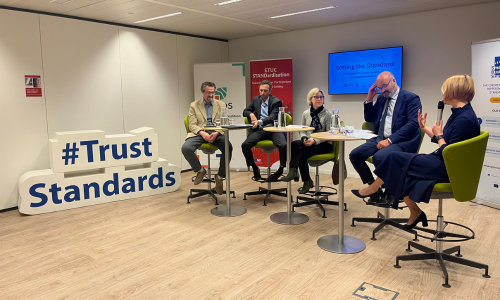On 17 November 2025, CEN and CENELEC, joined by the Annex III organizations: ANEC, ECOS, ETUC and SBS, hosted a high-level event in Brussels, bringing together key stakeholders to discuss the future of European Standardization. The dialogue focused on an inclusive standardization system, considering the pivotal legislative developments currently taking place, e.g. the Omnibus Regulation, the revision of the Standardization Regulation and the New Legislative Framework (see Policy - CEN-CENELEC).
We were honoured to welcome MEP Anna Cavazzini, Chair of the Internal Market and Consumer Protection Committee of the European Parliament, as the keynote speaker. Ms Cavazzini’s address emphasized:
- Standards as the backbone of the Single Market.
- Focus on simplification that makes sense. Standardization is the best way for simplification, to make it as easy as possible for all stakeholders. Simplification agenda should focus on solutions, solutions for simplification, in a smart way: standardization is a part of the smart solution for simplification.
- Standards playing a crucial role in making it as easy as possible for companies to implement legislative decisions.
Ewa Zielinska, the CENELEC Vice-President Policy, was joined in the panel by Chiara Giovannini, Deputy Director General at ANEC, representing the voice of consumers in standardization, Justin Wilkes, Executive Director at ECOS, the environmental voice in standardization, Claes-Mikael Ståhl, Deputy General Secretary of ETUC, bringing the perspective of workers and trade unions, and Jon Echanove, Secretary General of SBS, advocating for the interests of small and medium-sized enterprises in standardization.
Ewa Zielinska highlighted that the revision of the Standardization Regulation is an opportunity to reinforce the role of the European Standardization System by modernizing the existing framework and revitalizing the public-private partnership that underpins it. CEN and CENELEC offer an experienced and trusted system that is built on openness, transparency, consensus and inclusiveness from which we can continue to support Europe’s competitiveness, innovation and societal goals.
The panel discussion focused on the aspects that make European Standardization critical in today’s policy and market landscape, the most effective ways to ensure meaningful participation of SMEs and societal stakeholders at all levels of the standardization processes, and views on the revision of the Standardization Regulation.
The discussion confirmed that:
- Regulation 1025/2012 has greatly improved the inclusiveness of the European Standardization System, due to the contribution of the Annex III organizations.
- The strength of the ESS comes from its inclusiveness, and because of the inclusiveness, we can develop standards that are much more valuable. There is no system in the world that is as inclusive as the ESS, so we need to preserve that.
- Standards are the invisible infrastructure of competitiveness.
- To shape future markets, we need to develop standards that meet the needs of all stakeholders.
- In CEN and CENELEC’s 2025 AUWP, over half of the initiatives are related to the green transition and environmental protection: standards are crucial to foster innovation and development in green tech for market access to those products and services.
- There is a need to ensure support for SMEs and societal stakeholders at a national and European level to take part in standardization work.
- A crucial factor for ensuring inclusiveness and effective participation is the timely availability of expertise, supported by adequate human and financial resources.
- The Annex III are an example of best practice for how umbrella groups can participate in and influence standardization. Inclusiveness of the ESS makes it unique and allows it to deliver better quality products that meet market and public needs in a simple way.
- Many of the issues the revision of the standardization regulation is aiming to solve could be better addressed through better implementation rather than a full revision of the regulation.
- The revision, while needing to consider the speed and agility of standards, cannot come at the price of consensus and quality.
Thank you to all participants for contributing to this meaningful dialogue. The evening reaffirmed a shared commitment to a robust, inclusive and future-ready European Standardization System.




